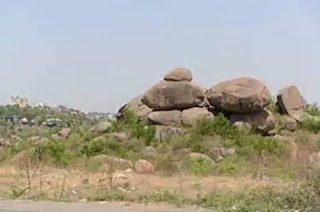Geology of Telangana: the state's geological diversity
Exploring the geology of Telangana can be an intriguing topic for a blogger, as the state's geological diversity has contributed to its landscapes, mineral wealth, and geological heritage.
Here's an overview of Telangana's geology that you can share with your readers:
Geological Formation: Telangana is situated in the southern part of India and shares its geological history with the Deccan Plateau. The state's geology is a result of various geological processes, including volcanic activities, sedimentation, and tectonic movements, which have occurred over millions of years.

Deccan Trap Basalts: A significant portion of Telangana is covered by the Deccan Trap basaltic lava flows. These basaltic rocks were formed due to massive volcanic eruptions during the Cretaceous period, around 66 million years ago. The Deccan Traps are famous for their distinctive step-like formations and are rich in mineral resources like basalt, granite, and laterite.
Sedimentary Formations: Telangana is also home to several sedimentary formations, including limestone, shale, and sandstone, which are found in various parts of the state. These sedimentary rocks hold important geological and paleontological information about the region's ancient environments and ecosystems.
Geological Structures: The state's geology includes various geological structures like faults, folds, and dykes. These structures have been shaped by tectonic movements over time and play a role in the distribution of minerals and water resources.
Godavari and Krishna River Basins: The Godavari and Krishna rivers, two major rivers of South India, flow through Telangana. The sedimentary deposits brought by these rivers have contributed to the formation of fertile alluvial plains, which support agriculture and are essential for the state's economy.
Mineral Resources: Telangana is rich in mineral resources, including coal, limestone, bauxite, iron ore, and mica. The mineral wealth has contributed to the growth of industries and economic development in the state.
Geological Heritage: Telangana has several geological sites of significance, including rock formations, waterfalls, caves, and ancient geological features. These sites hold scientific, educational, and recreational value, making them important geological heritage sites.
Geological Hazards: The state is prone to geological hazards such as earthquakes and landslides, primarily due to its tectonic location and geological structures. It is essential to understand and mitigate these hazards to ensure the safety and well-being of the people.
Telangana's geology presents a fascinating mix of ancient volcanic formations, sedimentary deposits, and mineral resources. Understanding the state's geological history can provide valuable insights into its natural heritage, landscapes, and resources. As a blogger, sharing information about Telangana's geology can create awareness about the earth sciences and the importance of conserving and appreciating the state's geological diversity. Google Search Engine
Know Dead Zones
Visit Official Home Page





0 Comments